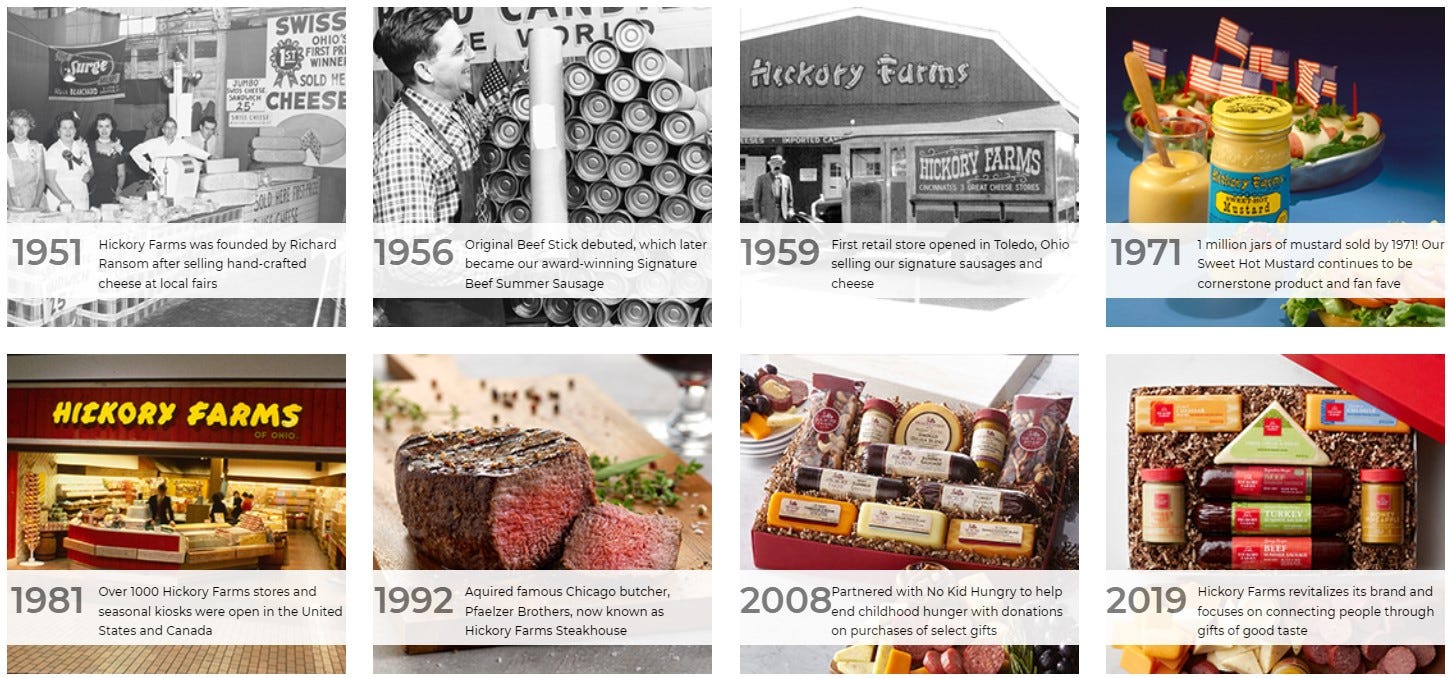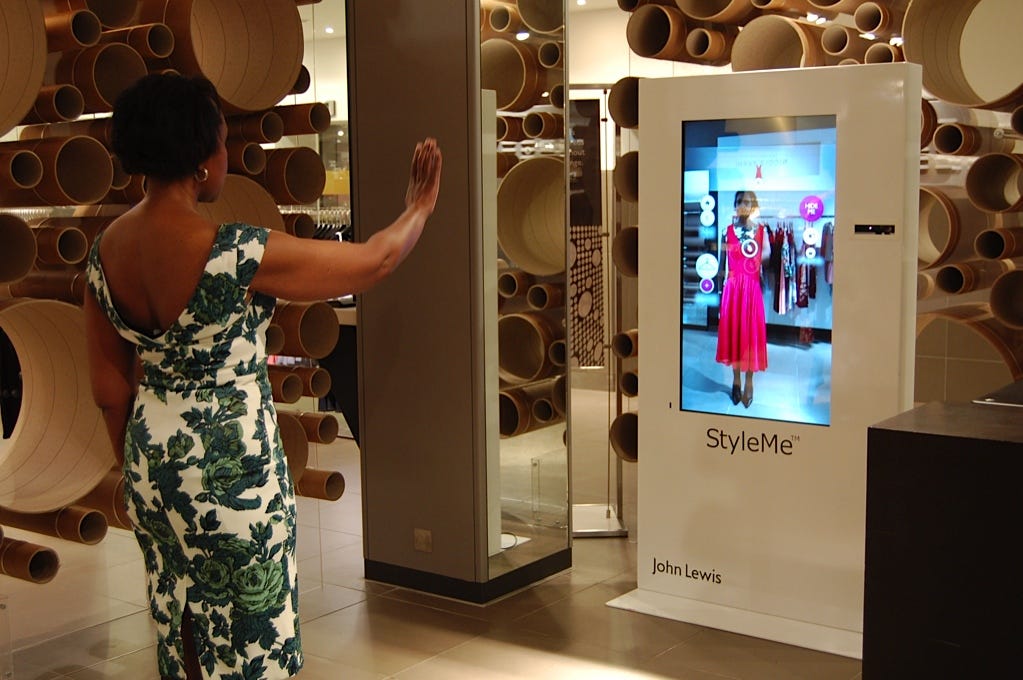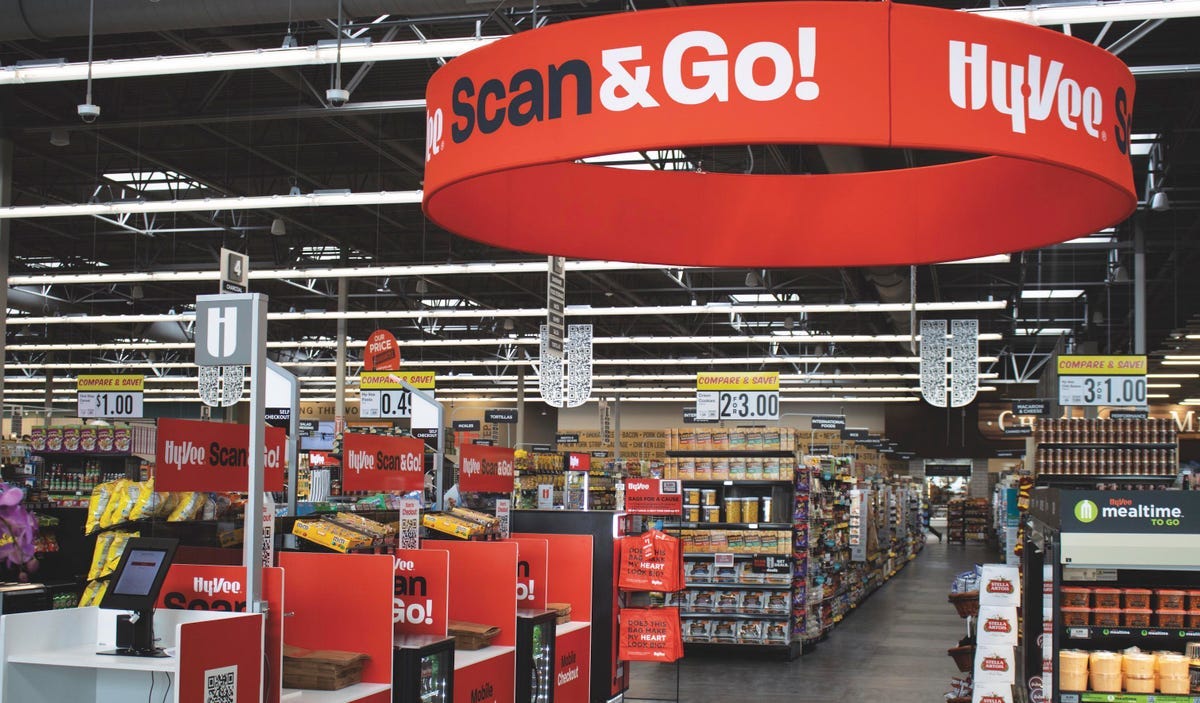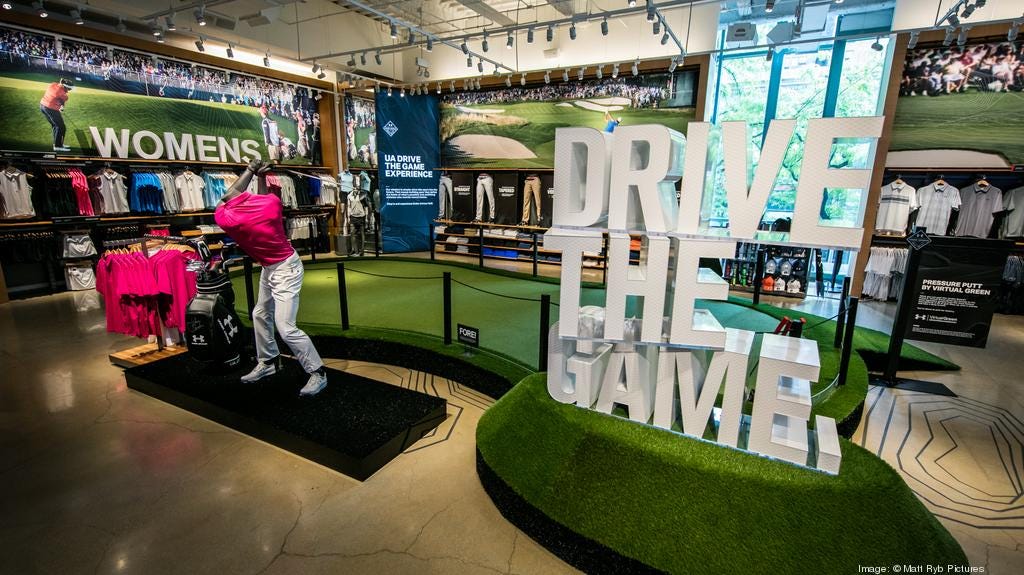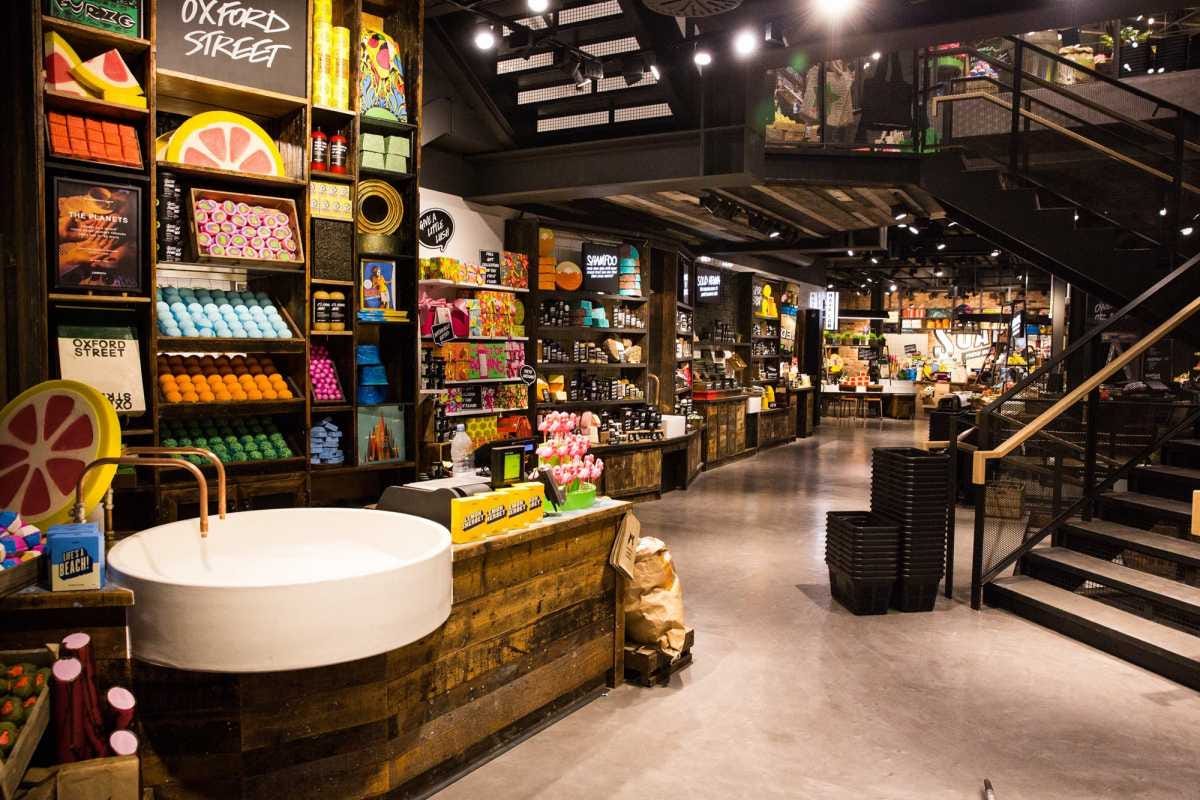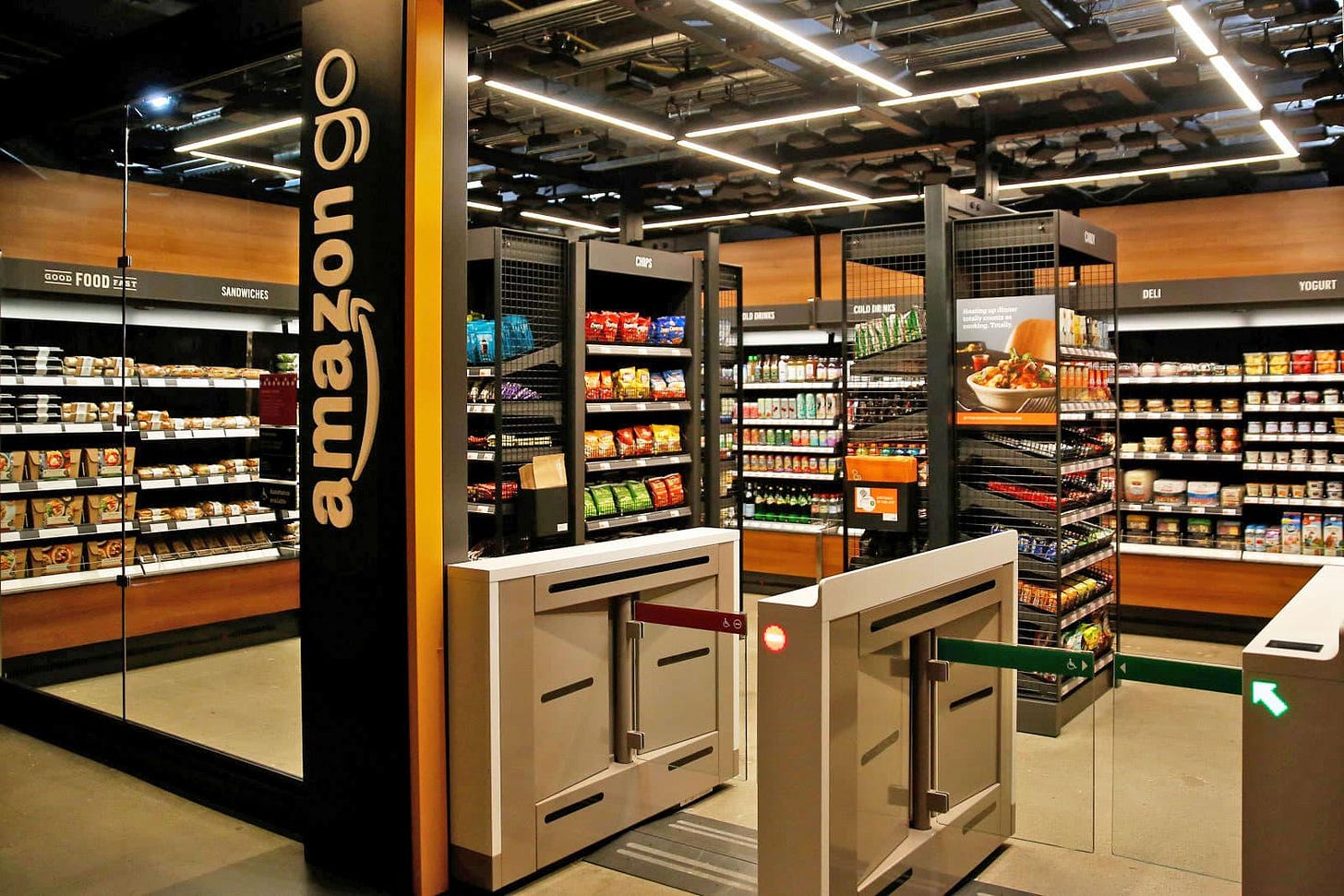Happy New Year!
This issue is free to all and a way of saying thanks for all of your support in 2021.
Thanks to all of you for your great support since I launched All Things Retail. Best wishes for a very happy new year and a healthy and successful 2022!
While this issue is free to all, as was last weeks, the paywall will return on January 4th. If you want to continue to have access to all of our content, please consider subscribing to our premium edition.
Hickory Farms, The Hidden Retailer of the Holidays:
Last week I wrote about the Hess Truck, a holiday icon. Here’s another one, although it may not be as top-of-mind as Hess. It’s Hickory Farms. Why write about them? A few reasons:
There are a bunch of great ideas they developed and utilized decades ago which still apply today to making a retail business successful.
They have fought through challenging times pretty successfully, pivoted nicely into DTC, and maintained a solid physical retail business despite a rapidly changing landscape.
They are pop-up store experts (and you know I love pop-up retailing). While their year-round stores have gone away, they “fish when the fish are biting” and open 500-ish temporary stores every holiday season.
Here an overview of their history, with some content pulled from the NY Times and encyclopedia.com):
In 1951, finding specialty meats and cheeses could take some doing if you lived in small-town America and had no neighborhood deli. For Richard K. Ransom, this was an opportunity.
In his early 30s, recently returned from fighting in the Pacific, Mr. Ransom was tired of driving a vegetable truck around rural Ohio for his parents’ wholesale produce business. So he started selling hand-cut cheeses at flower shows and boat shows. Soon he added summer sausage, then expanded to county fairs around the Midwest. He named his company Hickory Farms.
By the time he sold it in 1980, Hickory Farms was a $164-million-a-year specialty food business, with outlets in every state but Mississippi.
Hickory Farms grew explosively in the early years, thanks to what was then a novelty: free samples.
“It is almost impossible to enter a Hickory Farms store without tasting something,” Forbes magazine observed in a 1983 business profile, describing the ranks of smiling, apron-clad women positioned at store doorways and in the aisles with trays of food.
The women did not bother asking customers if they wanted a taste — they just cut off bite-size pieces and held them out to people, Robert Ransom recalled. Shoppers felt obligated to take and eat what they were offered, and after tasting meats and cheeses every few steps around the store, they felt obligated to buy something.
“It seems so simple now,” Robert Ransom said.
The elder Mr. Ransom also wrote an instruction manual for sales personnel, explaining how to cut blocks or wheels of cheese in a way that ensured that shoppers would always get a little more than they asked for.
“If you magnify that over thousands of customers in 600 stores every day of the year, it’s an enormous amount of money,” the son said.
The Ransoms established their first retail outlet in Toledo in 1959. The company fostered a country store image with store-fronts modeled after a red barn and friendly staffers wearing red and white checked shirts and denim skirts. Heavy sampling of sausages, cheeses, and jams was the order of every day. Richard Ransom put a great deal of stock in this marketing method, saying, “We think we have the finest products on the market and the best way to get people to agree with us is to give them a sample.” Ransom positioned sample displays in the doorways of his store to attract customers, then offered free coffee to keep them in the store for an extended period of browsing, tasting, and, it was hoped, buying.
Hickory Farms opened its first franchised store outside Toledo in 1960, the same year the company was incorporated. The stores quickly evolved into “seasonal monsters.” In Hickory Farms’ case, 40 percent of its sales were made during the fourth-quarter gift-giving holiday season, when its annual balance sheet traditionally went from the red to the black.
Chairman and chief executive officer Ransom earned a reputation as a strict manager with rigid standards and “Prussian discipline,” known for his “obsessive” control of—and support for—franchisees. He insisted on tight controls because, as he told Marketing Magazine’s Steve Blickstein in a June 1972 interview, “the public can get along without our product very well.” Ransom charged a low initial franchise fee, then collected five to six percent of each outlet’s weekly gross sales. He insisted on standardization, asserting in the Marketing Magazine interview that “A successful franchise is nothing more than the continuation of a good idea. It’s a repetition of success that eliminates excuses for failure.” Ransom was especially sold on the power of promotion, requiring each franchise to invest at least five percent of its gross sales on advertising, asserting that when “advertising goes down, sales go down. It’s that simple.” He gauged each store’s success according to weekly sales reports.
Mr. Ransom sold Hickory Farms for $41 million in 1980 to the General Host Corporation of Connecticut. Analysts thought the price was steep and attributed it to Hickory Farms’ shrewd marketing.
Today, Hickory Farms continues to sell its products online all year round, and adds about 500 physical pop-up stores every holiday season.
Retail News You Can Use:
3 Marvel Avenger Moments that Can Teach Entrepreneurs Resilience
Unpacking 5 Myths About Management
How To Launch A New Business: Three Approaches That Work
How to Start a Skincare Line: 11 Lessons From a Serial Beauty Entrepreneur
Vogue Business Index: Omnichannel Retail and What Fashion Can Learn from Beauty
The Lost Art of Retail and The Locals Who Keep It Going
Vast Majority of Consumers Respond When Brands’ Personalization Goes Wrong
After the ‘Great Resignation’ Hit Retail Hard in 2021, Here’s How Companies Plan to Hire and Retain Talent in 2022
Stores, Data, and Experiences: 5 Predictions for Retail in 2022
How Retailers can Evolve and Thrive in 2022
Cool Pics:
Some views of what the future of retail should look like that exist today!
Sponsored Content
There are tens of thousands of possible factory providers on sites such as Alibaba. But the reality is many of these are not truly the makers of the products they pitch, and even if they are, their timeliness, production quality, and pricing competitiveness are extremely difficult to understand.
We have a better solution!
Our firm, 3Pe Consulting, has more than 25 years of successful product sourcing experience from Asia. We have partnered with one of the pre-eminent factories in China to bring our "Strategic Sourcing Solutions" to North America. Our partner, based in Hong Kong, has a fully-owned factory in mainland China. They have been designing and producing products for companies such as Disney, Playmobil, Alex Toys and many more since 1981, and are a qualified supplier for retailers such as Wal-Mart, Target, Michael Stores, Amazon, Sam’s Club, Party City, Spencer Gifts, and Tesco. They provide a wide range of off-the-shelf products in multiple categories and have full capabilities to customize items to meet your specific needs. They also offer an extended reach for non-core products through a robust network of trusted sub-factories.
We will make the product sourcing process easy and simple for you. We will walk you through every step of the process, from ideation all the way until the product ships to you, and be there day in and day out to support your every need. You will never be alone as you develop products for your business.
Want to learn more about our Strategic Sourcing Services? If this is your first time considering importing items from Asia, or if you are an established seller who is looking for a better way to manage their sourcing efforts, we should chat. Reach out today to schedule a non-obligation introductory call.
Click here, fill out the short form, and we will be back in touch very quickly.
Quotes of the Week:
“Celebrate endings—for they precede new beginnings.” — Jonathan Lockwood Huie
“I like the dreams of the future better than the history of the past.” — Thomas Jefferson
“It’s never too late to become who you want to be. I hope you live a life that you’re proud of, and if you find that you’re not, I hope you have the strength to start over.” —F. Scott Fitzgerald



